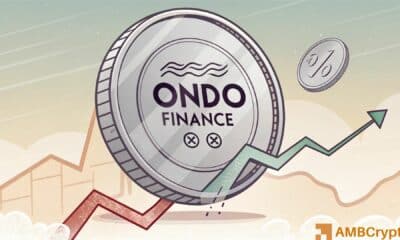News
Goldman Sachs clears the air regarding the launch of its ‘in-house’ stablecoin
Stablecoins provided corporations with the best of both worlds: a stable means of transacting fiat-based value on the blockchain. It’s no surprise that many major corporate conglomerates were investigating stablecoins. Some even hoped of releasing their own in-house digital coin. One of the largest banks, JP Morgan Chase released its ‘JPM Coin” in 2020 to send payments around the world.
Not anytime soon
Goldman Sachs, another American multinational investment bank won’t be riding the same wagon as above. At least for now. According to a report
by Bloomberg, Goldman Sachs had no plans on issuing an in-house digital token.Goldman Sachs said that, while it’s exploring creating a stablecoin with partners, the introduction of a digital currency — if any — remains a ways off https://t.co/ODRimhxG40
— Bloomberg Crypto (@crypto) January 28, 2022
Maeve DuVally, a Goldman Sachs’ representative opined:
“We have no immediate intention of creating a Goldman Sachs coin. We continue to see value working closely with private institutions looking to create a ubiquitous stablecoin that meets legal and regulatory requirements and has transparent governance.”
The said bank had invested in Circle Internet Financial Ltd., the backer of USD Coin, one of the largest stablecoins by market capitalization. Moreover, in 2020, Goldman’s digital asset global head Matthew McDermott portrayed a similar interest. The bank was contemplating its own cryptocurrency, possibly a stablecoin. He also signaled at a potential collaboration with social media giant Facebook (now known as Meta) or with banking rival JPMorgan.
Hmm… could this be the reason?
Fast forward, there were certain developments concerning stablecoins. Mostly on the regulatory basis. As mentioned above, regulatory watchdogs highlighted a few risk concerns. Bank of England Governor Andrew Bailey cautioned the same scenario. ‘Facebook would pose a “very big challenge to the system” if it went ahead with launching a stablecoin.’
Soon after, Meta’s ambitious Diem stablecoin project sold its assets to Silvergate Capital Corp. for about $200 million.
Overall, the onslaught of regulatory pressure and backlash could be one of the reasons behind Goldman Sachs’ uncertainty.
